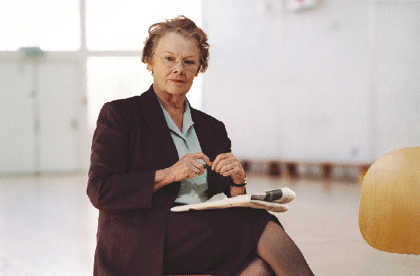By Leonard Quart
“Notes on a Scandal” is literate entertainment — a stunningly-acted psychological thriller that is characterized by plot twists and turns, and melodramatic, over-the-top emotions. A number of major Brit talents helped shape the film based on Zoë Heller’s novel “What Was She Thinking: Notes on a Scandal,” which was shortlisted for the Booker Prize. They include its director Richard Eyre (director of the Royal National Theater and the film “Iris”), screenwriter Patrick Marber (“Closer”), and cinematographer Chris Menges (“The Killing Fields”). But “Notes” is not a director’s film. It contains little of visual interest, or of Eyre’s personal vision.
But he is wonderful with his actors, eliciting an explosive, riveting performance from Judi Dench as the tartly observant but self-deluded lesbian narrator, Barbara Covett, and a solid, if too overwrought one from Cate Blanchett as her fragile victim, Sheba Hart.
Barbara is a spinster history teacher at a working class London secondary school, contemptuous of both her students and colleagues, who lives a solitary life with a cat as her only companion. Sheba is the school’s new art teacher, an upper class, quasi-bohemian whose life has lost its moorings. She has a cheerful son with Down syndrome, and an unhappy marriage to a sophisticated and sympathetic older man played by Bill Nighy, whose character is barely explored.
Barbara hungers for a friendship with the open and undefended Sheba, who finds teaching and controlling her class difficult, and welcomes the older women’s advice. But the predatory and manipulative Barbara desires to devour her, and fantasizes that they can develop a deep connection, possibly even a sexual one. When Sheba begins an inexplicably foolish and self-destructive affair with a sexually aggressive 15-year-old student, Barbara seizes the opportunity to emotionally blackmail Sheba. As the protector of her secret, Barbara is able to insinuate herself in Sheba’s life — until she decides to betray her.
The film is not about a teacher having inappropriate sex with a pupil (Andrew Simpson), since the boy, for all his macho ordinariness, seems more understanding of the nature of their relationship than even Sheba, who wanders through the film totally clueless. We do learn that her mother has contempt for her — seeing Sheba as a person “without substance” — and that she has failed as an artist. But the audience still must suspend disbelief to accept Sheba’s utter emotional dimness, and her readiness to be victimized.
By the conclusion of this overheated film, one feels that there is something a touch risible about all the hysterical carrying-on. What the characters need is some emotional tamping down, and greater psychological subtlety. Barbara’s bitchery and pathological need to control are a bit too excessive, and Sheba is just too unseeing to be plausible. And Philip Glass’ too lush and intrusive score reinforces the film’s emotional extremity.
Still, Judi Dench’s brave performance is a knockout. Playing without a trace of vanity a very smart, thoroughly unpleasant, emotionally vindictive woman, she grips our attention whenever she appears on screen. The film’s heavy-handedness lies in the script, not Dench’s performance, which grants her character poignancy despite her generally repellent, destructive behavior.
“Notes on a Scandal” may not be a very nuanced work, but it’s a cleverly written, eminently watchable one.


































